The Way It Is/ America's all-time top ten race drivers
by Gordon Kirby My Christmas column about why Dan Gurney is America's greatest all-round racing man generated plenty of interesting conversation. Everyone has their opinions of course, but few people disputed my reasoning. Some got to talking about who they believe are qualified to rank among the country's ten greatest drivers of all-time, which is always an amusing rumination. I find it's pretty easy to pick America's top eight or nine greatest racers but rounding out the top ten is another matter. Still, it's fun to take a stab at who's who in the sport's hundred-plus years history so as racing's second century continues to unfold here's my personal choice of the USA's top ten race drivers of all-time.
My Christmas column about why Dan Gurney is America's greatest all-round racing man generated plenty of interesting conversation. Everyone has their opinions of course, but few people disputed my reasoning. Some got to talking about who they believe are qualified to rank among the country's ten greatest drivers of all-time, which is always an amusing rumination. I find it's pretty easy to pick America's top eight or nine greatest racers but rounding out the top ten is another matter. Still, it's fun to take a stab at who's who in the sport's hundred-plus years history so as racing's second century continues to unfold here's my personal choice of the USA's top ten race drivers of all-time.
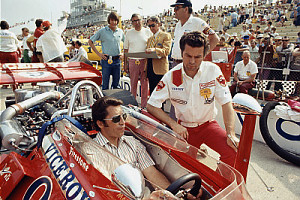
© LAT
2) Dan Gurney: As documented in my Christmas column, Gurney is America's greatest overall racing man and is second only to Andretti as a driver. Dan, too, was Mr. Diversity. He was an F1 race winner as well as a car builder and team owner, an Indy car race winner, Le Mans 24 hours winner, Nurburgring 1000Ks winner, Sebring winner, five-time Riverside NASCAR winner and one of Jim Clark's greatest rivals. The only flaw in Dan's amazing record is that he never won a major championship, unless you count his 1958 USAC road racing title!
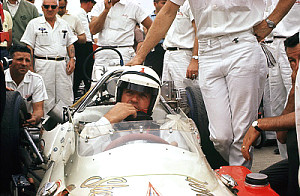
© LAT
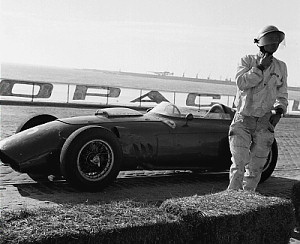
© LAT
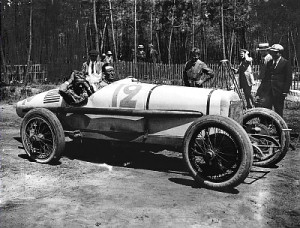
© LAT
6) Frank Lockhart: Murphy's death robbed the world of a head-to-head duel for supremacy with the next young superstar of the great board track era. Lockhart was a California dirt track driver who won the Indy 500 in 1926 in his rookie start aboard one of Harry Miller's factory cars. Over the folllowing eighteen months Lockhart cut a glorious swath across the sport, winning nine AAA board track races between June, 1926 and October, 1927, and finishing second in the 1926 and '27 AAA championships. In May of 1927 on the 1.5-mile Atlantic City board track, Lockhart set an American closed course qualifying record of 147.729 mph which stood unchallenged until 1960! He also designed and built the incredible Stutz Black Hawk, aiming to set a new land speed record. Powered by twin, supercharged Miller straight-eights, the car set new standards for aerodynamic sleekness and Lockhart appeared capable of achieving his goal only to be kllled while driving his creation on Daytona Beach in April of 1928 when a tire blew at more than 200 mph.
7) Bobby & Al Unser: I'm going to cheat a little with the Unser brothers from Albuquerque who were the sons and nephews of a trio of racing Unser brothers from Colorado Springs. Uncle Louis won the Pike's Peak hllclimb nine times between 1934-'53 while Jerry's son Bobby and Al also dominated at the Peak. Bobby won the mountain climb ten ten times between 1956-'86 and younger brother Al won it twice in 1965 and '66. The brothers went on to win seven Indy 500s (four for Al and three for Bobby), plus five USAC/CART championships. Al is ranked fourth on the all-time Indy/Champ car winners list with 39 wins and Bobby is ranked fifth with 35 wins ahead of Al Jr. who won 31 races, including two more Indy 500s and two more CART titles for an unparalleled family record.
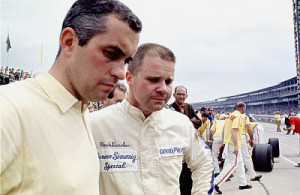
© LAT
9) Rick Mears: A four-time Indy 500 winner and three-time CART champion who also won at Pike's Peak, Mears personified both CART Indy car racing and Penske Racing through the eighties and into the early nineties. Mears was the smoothest, most sportsmanlike driver of his era. He was also the fastest, cleanest speedway driver of those times and represents a superb example for the entire sports world of how an athlete should comport themself--fair, good-humored, eminently sportsmanlike and blindingly fast on the quickest of racetracks. That's Rick Mears' legacy.
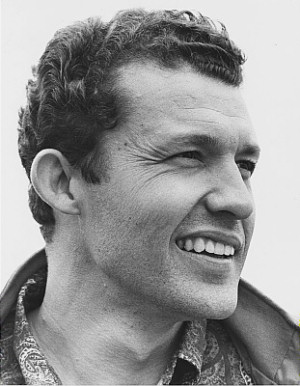
© LAT
From NASCAR, there's also a strong list of contenders led by Richard Petty and Dale Earnhardt, and including David Pearson, Bobby Allison, Cale Yarborough, Darrell Waltrip, Junior Johnson, Fireball Roberts, Lee Petty and Curtis Turner. For my part, I was extremely impressed with Pearson when he challenged Mark Donohue in the inaugural IROC series. Donohue tested and developed the Porsche Carrera RSRs used in the first IROC series but Pearson was able to threaten Donohue and beat all the F1 and sports car drivers. On the road courses he was smooth as silk in an unfamiliar car that was very difficult to drive on the limit. The other NASCAR star of the past thirty years who really impressed me was Cale Yarborough, a relentless bull of a driver. I will always remember how unbelievably aggressive Yarborough was in making up two lost laps to win the 1977 Daytona 500 in a Junior Johnson Chevrolet.
From 1960s and '70s-style SCCA sports car racing there's Chaparral creator and driver Jim Hall and TransAm and CanAm champion George Follmer, both of whom raced F1 cars for one year. From IMSA GTP racing in its '80s heydays there's five-time IMSA champion and Le Mans and Daytona 24 hours winner Al Holbert who stood-out as the class driver in his category. And from the Gurney/Hill era of the fifties and sixties, there was Richie Ginther an excellent sports car driver and F1 race winner who finished second in the 1963 world championship.
You can make arguments for all these excellent racers, particularly Vukovich, Jones, Pearson and Yabrorough, but none can beat the King, Richard Petty, to the final place in America's pantheon of all-time greats. After all, Petty won 200 NASCAR races, a record in all forms of racing, and his seven championships are equalled only by A.J. Foyt in USAC, Dale Earnhardt in NASCAR and Michael Schumacher in F1. Beyond that, Petty was the first NASCAR driver to make a mark in America's mainstream mass market culture. In the late '60s and throughout the '70s, King Richard defined NASCAR and helped establish modern stock car racing in the wake of the formative, Junior Johnson-style whiskey-running days. Without Richard Petty, the rise of his 1980s and '90s heir Dale Earnhardt would not have been possible. Long before Earnhardt, the King built NASCAR's foundation.
The remarkable thing about this walk down memory lane is the stark realization that we are living today in a Lilliputian world of motor racing where, as King Richard himself says, entertainment and marketing rule rather than racing as we once knew it. All but three of my top ten drivers are alive and kicking today and raced into the modern era. Yet in the first decade of the 21st century real diversity in the manner of Andretti and Gurney has been removed from the sport and there's only one American who has earned the right to be a called a great driver.
Jeff Gordon is a four-time NASCAR champion who stands out from the crowd of modern American racing superstars, but even Gordon has a long way to go to equal the accomplishments of my top ten. Outside testing an F1 Williams-BMW, his record of diversity beyond NASCAR is slim at best. In fact, incredibly, the Rolex 24 at the end of this month will be Gordon's sports car racing debut! The only other contemporary American racer who has the potential to make his way over time into the grand pantheon is two-time NASCAR champion Tony Stewart whose record of diversity is broader than Gordon's. But Stewart has an even longer road ahead of him if he's ever to break into the legion of true greats.
It will be interesting to see if any contemporary drivers will be able to emerge from the pack over the next ten or twenty years to claim places among the sport's greatest racers. Yet looking at the facts, it seems highly unlikely that any of my current top ten will be dislodged by a driver from the 21st century for generations to come, if ever. Whatever conclusions you may wish to draw, there's no doubt that the greats from the past century established some awfully high standards for today's racers to shoot at.
Auto Racing ~ Gordon Kirby
Copyright 2007 ~ All Rights Reserved
Copyright 2007 ~ All Rights Reserved
Top of Page